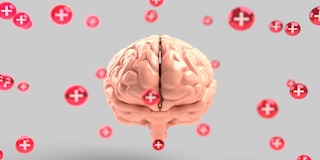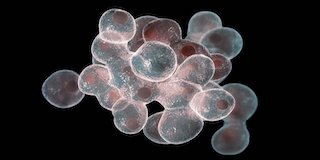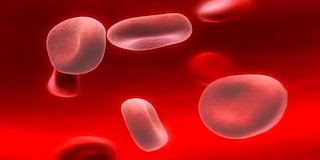Each somatic cell in the body generally contains the same DNA. A few exceptions include red blood cells, which contain no DNA in their mature state, and some immune system cells that rearrange their DNA while producing antibodies. In general, however, the genes that determine whether you have green eyes, brown hair, and how fast you metabolize food are the same in the cells in your eyes and your liver, even though these organs function quite differently. If each cell has the same DNA, how is it that cells or organs are different? Why do cells in the eye differ so dramatically from cells in the liver?
Whereas each cell shares the same genome and DNA sequence, each cell does not turn on, or express, the same set of genes. Each cell type needs a different set of proteins to perform its function. Therefore, only a small subset of proteins is expressed in a cell. For the proteins to be expressed, the DNA must be transcribed into RNA and the RNA must be translated into protein. In a given cell type, not all genes encoded in the DNA are transcribed into RNA or translated into protein because specific cells in our body have specific functions.
Specialized proteins that make up the eye (iris, lens, and cornea) are only expressed in the eye, whereas the specialized proteins in the heart (pacemaker cells, heart muscle, and valves) are only expressed in the heart. At any given time, only a subset of all of the genes encoded by our DNA are expressed and translated into proteins. The expression of specific genes is a highly regulated process with many levels and stages of control. This complexity ensures the proper expression in the proper cell at the proper time.
© Mar 13, 2014 Jeffrey Mahr. Textbook content produced by Jeffrey Mahr is licensed under a Creative Commons Attribution License 4.0 license.
“Source: Gene Expression. Open Stax CNX | Download for free at https://cnx.org/contents/628c2101-3701-4245-be78-a8d30828a74b@1.1.”
Course Curriculum
| 1. Gene Expression - Introduction (GPC) | |||
| Gene Expression – Introduction (GPC) | FREE | 01:30:00 | |
| 2. Gene Expression - Regulation (GPC) | |||
| Gene Expression – Regulation (GPC) | 01:30:00 | ||
| 3. Gene Expression - Prokaryotic Gene Regulation | |||
| Gene Expression – Prokaryotic Gene Regulation | 01:30:00 | ||
| 4. Gene Expression - Eukaryotic Transcriptional Regulation (GPC) | |||
| Gene Expression – Eukaryotic Transcriptional Regulation (GPC) | FREE | 01:30:00 | |
| 5. Eukaryotic Post-transcriptional Gene Regulation (GPC) | |||
| Eukaryotic Post-transcriptional Gene Regulation (GPC) | 01:30:00 | ||
| 6. Eukaryotic Translational and Post-translational Gene Regulation (GPC) | |||
| Eukaryotic Translational and Post-translational Gene Regulation (GPC) | 01:30:00 | ||
| 7. Gene Expression - Epigenetic Gene Regulation (GPC) | |||
| Gene Expression – Epigenetic Gene Regulation (GPC) | FREE | 01:30:00 | |
| 8. Cancer and Gene Regulation (GPC) | |||
| Cancer and Gene Regulation (GPC) | FREE | 01:30:00 | |




